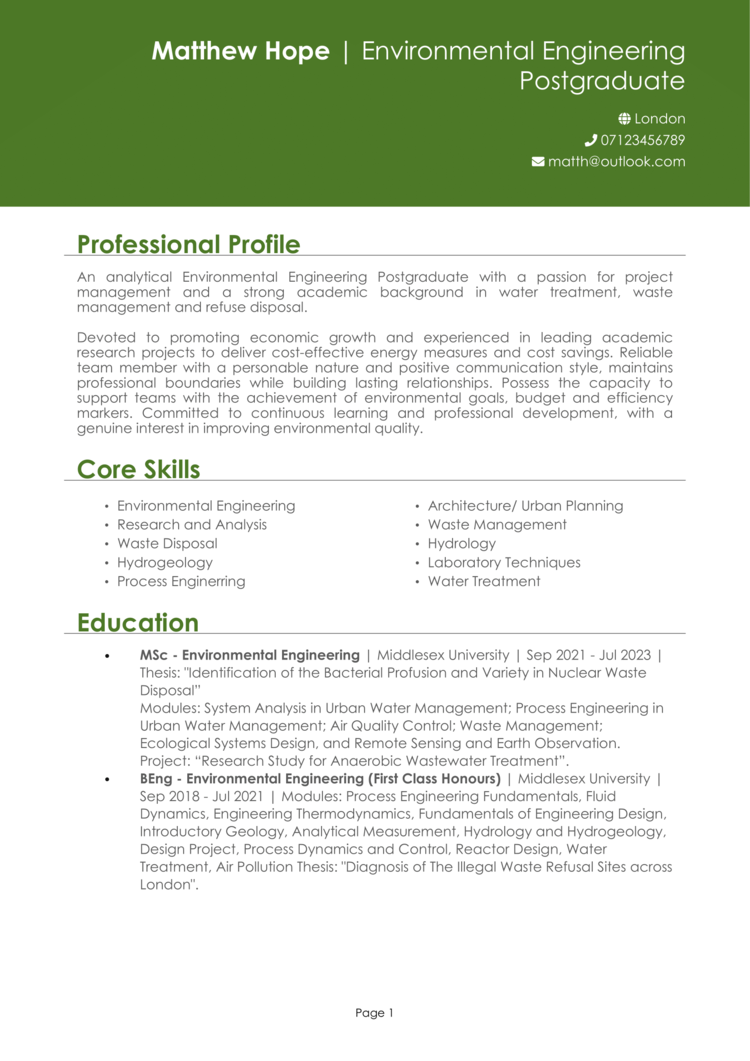
You’ve wrapped up your degree and are keen to embark on your PhD journey.
But before you can get stuck in, you’ll need to secure your place by putting forward a compelling PhD application and CV.
If you’ve never written an academic-style CV before, the process can be daunting. That’s why I’ve created this step-by-step guide to writing a CV for a PhD application.
I’ve also included a PhD CV example, to give you a better idea of what you need to include. Here’s what I’ll cover in the guide:

As you can see from the CV example above, a PhD CV is structured differently to a traditional CV. Instead of focusing on work experience, academic experience and accomplishments are prioritised.
However, the fundamental CV writing rules stay the same. Therefore, the candidate has put forward their information in a way which is clear, concise and formatted for easy reading.


PhD programmes receive thousands of applications, meaning the university admissions teams are generally very time-strapped.
As such, you need to structure and format your CV to make it as easy as possible for them to review.
First impressions count and a cluttered or disorganised application won’t do you any favours.
Instead, you should aim for a clean, well-organised and professional appearance throughout.
Organise your content into the following sections for ease-of-reading:
Quick tip: While the simple CV format above is usually ideal, academic institutions often have their own preferred structure. Double-check their guidelines before you start writing – their preferences should be prioritised – and use a CV template if you want to speed things up without sacrificing quality.

Commence your CV by sharing your basic contact details
Your profile/personal statement is essentially your first impression on the reader and is a great way to hook their attention.
It should provide a snappy summary of who you are and why your qualifications, skills and ambitions make you a perfect candidate for the PhD.

Tips to consider when creating your personal statement:


Next, create a punchy list of core skills, organised into 2 or 3 columns of bullet points.
Use the project description to identify the required skills and knowledge, then use your findings to inform your list.

This will help the busy admissions team to see that the PhD is right for you at a glance.
A PhD CV is all about academic achievements and qualifications, so this section should make up the bulk of your CV.
Working in reverse chronological order, provide a detailed breakdown of your undergraduate and postgraduate qualifications.
If you have any GCSEs, A-Levels or other academic qualifications that are particularly relevant to the PhD subject, they might be worth listing, too.
By working to a considered structure, you can ensure your education is easy to navigate and that your key achievements stand out.
For each of your relevant qualifications, break up information into the following sections.
Outline
Start by detailing the type of qualification, the title, the achieved grade, the academic institution at which you studied and the year you graduated.
MSc – Environmental Engineering (Distinction)
Middlesex University (2018)
Course content
Next, discuss your thesis or dissertation title (if applicable), the modules you studied and any relevant projects you were involved in.
What you choose to write here should be tailored to the PhD you’re applying for – focus the detail on the most relevant aspects of the qualification.
Thesis: “Identification of the Bacterial Profusion and Variety in Nuclear Waste Disposal”.
Modules: System Analysis in Urban Water Management; Process Engineering in Urban Water Management; Air Quality Control; Waste Management; Ecological Systems Design, and Remote Sensing and Earth Observation.
Project: “Research Study for Anaerobic Wastewater Treatment”
Key achievements (optional)
Finish up with a snappy list of key results, accomplishments or learning outcomes you achieved.
This might be an impressive grade for a highly relevant assignment, an award you won or a quote of exemplary feedback from a tutor.
Next up is your career & research summary, which should be tailored to the PhD in question.
You could include relevant research experience here, as well as any related employment (even if temporary or voluntary).
Make sure to be selective with the type of employment you list, though. For example, a part-time waiting on job isn’t worth including, but a laboratory or tutoring job might be. Ultimately, it should be related to your field or have helped you develop relevant skills or knowledge.
When discussing your research roles, make sure to detail the techniques you used, the skills developed and any interesting findings.
Ensure your career & research section is clear, scannable and easy to read by working to the following structure:
Key info
Outline the dates of employment/contract, the role title and the organisation or institution you worked for.
Aug 2018 – Sep 2019 Research Intern Hydro Continental, London
Outline
Give a brief overview of the position or research project as a whole, discussing the team you worked with (or lead), who you reported to and what the goal of the project was.
“Undertook a short-term assignment pertaining to the Economics of climate change in order to research and drive improvements in energy consumption and emissions; reported to the Executive Engineer.”
Key responsibilities
Then use bullet points to pinpoint your duties and responsibilities within the role, making sure to mention any relevant techniques or skills used that could benefit your candidacy.
E.g.


Applying for a PhD is a daunting yet exciting time, but a flawless CV can help you achieve your goals.
Remember to tailor your CV to the specific PhD you’re applying for and aim to make a compelling case for your suitability and aligned goals.
Before you send off your CV, try to get a second opinion from a current or previous tutor, trusted family member or friend.
It’s also worth checking the finished document with our quick-and-easy CV Builder, to eliminate the risk of overlooking mistakes.
Best of luck with your PhD application!